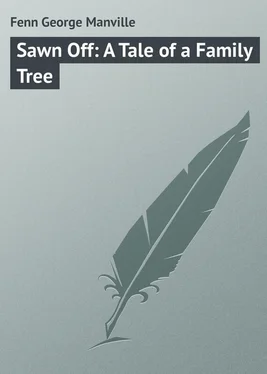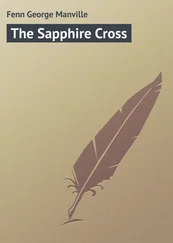George Fenn - Sawn Off - A Tale of a Family Tree
Здесь есть возможность читать онлайн «George Fenn - Sawn Off - A Tale of a Family Tree» — ознакомительный отрывок электронной книги совершенно бесплатно, а после прочтения отрывка купить полную версию. В некоторых случаях можно слушать аудио, скачать через торрент в формате fb2 и присутствует краткое содержание. Жанр: foreign_prose, на английском языке. Описание произведения, (предисловие) а так же отзывы посетителей доступны на портале библиотеки ЛибКат.
- Название:Sawn Off: A Tale of a Family Tree
- Автор:
- Жанр:
- Год:неизвестен
- ISBN:нет данных
- Рейтинг книги:4 / 5. Голосов: 1
-
Избранное:Добавить в избранное
- Отзывы:
-
Ваша оценка:
- 80
- 1
- 2
- 3
- 4
- 5
Sawn Off: A Tale of a Family Tree: краткое содержание, описание и аннотация
Предлагаем к чтению аннотацию, описание, краткое содержание или предисловие (зависит от того, что написал сам автор книги «Sawn Off: A Tale of a Family Tree»). Если вы не нашли необходимую информацию о книге — напишите в комментариях, мы постараемся отыскать её.
Sawn Off: A Tale of a Family Tree — читать онлайн ознакомительный отрывок
Ниже представлен текст книги, разбитый по страницам. Система сохранения места последней прочитанной страницы, позволяет с удобством читать онлайн бесплатно книгу «Sawn Off: A Tale of a Family Tree», без необходимости каждый раз заново искать на чём Вы остановились. Поставьте закладку, и сможете в любой момент перейти на страницу, на которой закончили чтение.
Интервал:
Закладка:
But this idea, probably, did not present itself to the inhabitants of Crowder’s Buildings, a pleasant cul de sac in the neighbourhood of the Angel at Islington. Crowder, once upon a time, bought two houses in a front street, between and under which there was an entrance like a tunnel, leading to the back gardens and back doors of the said houses; and Crowder – now dead and numbered with the just – being a man of frugal mind, gazed at the gardens of his freehold messuage and tenements, and saw that they were useful as cat walks, to make beds growing oyster and other shells, and vegetables of the most melancholy kind. He let the fact dawn upon his understanding that the vegetables grown might be bought better for sixpence per annum, and resolved that he would utilise the space.
To do this, he built up two rows of staring-eyed, four-roomed tenements, sixteen in all, separated by twelve feet of pavement, whitewashed them as they stood staring at one another, and turned the two garden deserts into a busy, thrifty hive, where some twenty or thirty families flourished and grew dirty.
The occupants of the two houses in the street complained, and left; but Crowder let the houses at a higher rent without the gardens – let the little tenements each at ten shillings a week, and turned out those who did not pay; and for the rest of his life collected his own dues, did his own painting and whitewashing – even plastered upon occasion; and at last, while repairing a chimney-stack and putting on a new pot, at the age of seventy-five, like a thrifty soul as he was, he slipped from the ladder, rolled off the roof of Number 10, fell into the open paved space, with his head in the centre gutter, where the soapsuds ran down, and his heels on a scraper – every house had a scraper, to make it complete – and was so much injured that Nature gave him notice to quit his earthly habitation, evicted him, and, save in name, the buildings knew him no more.
For they passed into the hands of Maximilian Shingle, “broker and setrer,” as his brother said – a most worthy member of society: a sticky-fingered man, who, through this last quality, was enabled to lay up honey in store. In fact, he was so well off that, when Crowder’s Buildings were brought to the hammer by Crowder’s heirs, executors, administrators and assigns, the hammer that knocked them down knocked them into Max Shingle’s possession, and they were paid for with Mrs Fraser’s money – a certain amount in thousands which she bestowed, with her two sons Fred and Tom – upon the man who re-won her heart six months after Fred Fraser senior’s death.
It was a retired spot after passing through the tunnel, and hence it became the popular playground of the children of the neighbourhood, who chalked the pavement, broke their knees and heads upon its harsher corners, and made it the scene of the festive dance when a dark-visaged organ-man came down to grind the last new airs of the day.
By a great act of benevolence, Maximilian Shingle, who was a lowly, good man, a shining light at his chapel, where he was deacon, had, though inundated with applications for Number 4 when it became empty, let it to his unlucky brother Richard, who flourished under the sign that heads this chapter, made boots and shoes, and neatly executed the repairs in the dilapidated Oxonians and strong working-men’s bluchers that came to his lot.
It was first-floor front-room cleaning-up day at Richard Shingle’s; and Mrs Shingle – familiarly spoken to as “mother” – was in her glory, having what she called “a good rummage.” Had her home possessed a back yard or a front garden, every article of furniture would have been turned out; but as there was not an inch of back yard, and the front garden was very small, being limited to six flowerpots behind a small green fence on the upstairs window-sill, Mrs Shingle was debarred from that general clearance.
But she did the best she could to get at the floor for a busy scrub while her husband and daughter were away; and the consequence was that the side-table had its petticoats tucked up round its waist, thereby revealing the fact that its legs were not mahogany, but deal; the hearthrug was rolled up, and sitting in the big-armed Windsor chair; the fender had gone to bed in the back room; and the chairs seemed to be playing at being acrobats, and were standing one upon the other; while the chimney ornaments – shepherds and shepherdesses for the most part – were placed as spectators on the top of the little cupboard to look on.
Mrs Shingle finished her task of cleaning up before descending, carrying a pail which had to be emptied and rinsed out before her hands were dried.
Mrs Shingle was a pleasant, plump woman, who had run a good deal to dimple; in fact, the backs of her hands were full of coy little pits, where the water hid when she washed, and her wedding ring lay in a kind of furrow, from not having grown with her hands.
She gave a few touches with a duster to the lower room, which was half sitting, one-fourth kitchen, and one-fourth workshop, inasmuch as there was a low shoemaker’s bench, with its tools, under the window, beneath which, and secured to the wall by a strap, were lasts, knives, awls, pincers, and various other implements of the shoemaker’s art. On a stand close by stood a sewing machine, and on the table were patches of kid and patent leather, evidently awaiting the needle.
Mrs Shingle had finished her hurried cleaning, and the furniture was put back; had been to the glass and arranged her hair, and finished off by taking out three pins, which she stuck in her mouth, as if it were a cushion, giving herself a shake, which caused her dress, that had been round her waist, to fall into its customary folds; and then, sitting down she was busy at work binding boot-tops, when the open door was darkened, and a fashionably dressed young man, of five-and-twenty, tapped on the panel with the end of his stick, entered with a languid walk, said, “How do, aunt?” and seated himself on the edge of the table.
The visitor’s clothes were very good, but they had a slangy cut, and might have been made for some Leviathan of a music-hall, who intended to delineate what he termed “a swell.” For the cuffs of the excessively short coat nearly hid the young fellow’s hands, even as the ends of his trousers almost concealed his feet; his shirt front was ornamented with large crimson zigzag patterns, and his hat was so arranged on the back of his head that it pressed down over his forehead a series of unhappy, greasy-looking little curls, which came down to his eyebrows.
Mrs Shingle nodded, and stabbed a boot-top very viciously as the young man saluted her.
“Old man out?” he said.
“You know he is,” retorted Mrs Shingle, “else you wouldn’t have come.”
“Don’t be hard on a fellow, aunt. You know I can’t help coming. Where’s Jessie?”
“Out,” said Mrs Shingle, sharply.
“She always is out when I come,” drawled the young man, tapping his teeth with his cane. “I believe she is upstairs now.”
“Then you’d better go up and see,” exclaimed Mrs Shingle. “Look here, Fred, I’m sure your father don’t approve of your coming here.”
“I can’t help what the governor likes,” was the reply.
“I’m not going to ask him where I’m to go. Is Jessie out?”
“I told you she was, sir.”
“Don’t be so jolly cross, aunt. It’s all right, you know. The old man will kick a bit, but he’ll soon come round. Don’t you be rusty about it. You ought to be pleased, you know; because she ain’t likely to have a chance to do half so well. I shall go and meet her.”
As he spoke, the young man – to wit, Frederick Fraser, step-son of Maximilian Shingle, Esq, of Oblong Square, Pentonville – slowly descended from the table, glanced at himself in the glass, and made for the door.
Читать дальшеИнтервал:
Закладка:
Похожие книги на «Sawn Off: A Tale of a Family Tree»
Представляем Вашему вниманию похожие книги на «Sawn Off: A Tale of a Family Tree» списком для выбора. Мы отобрали схожую по названию и смыслу литературу в надежде предоставить читателям больше вариантов отыскать новые, интересные, ещё непрочитанные произведения.
Обсуждение, отзывы о книге «Sawn Off: A Tale of a Family Tree» и просто собственные мнения читателей. Оставьте ваши комментарии, напишите, что Вы думаете о произведении, его смысле или главных героях. Укажите что конкретно понравилось, а что нет, и почему Вы так считаете.












